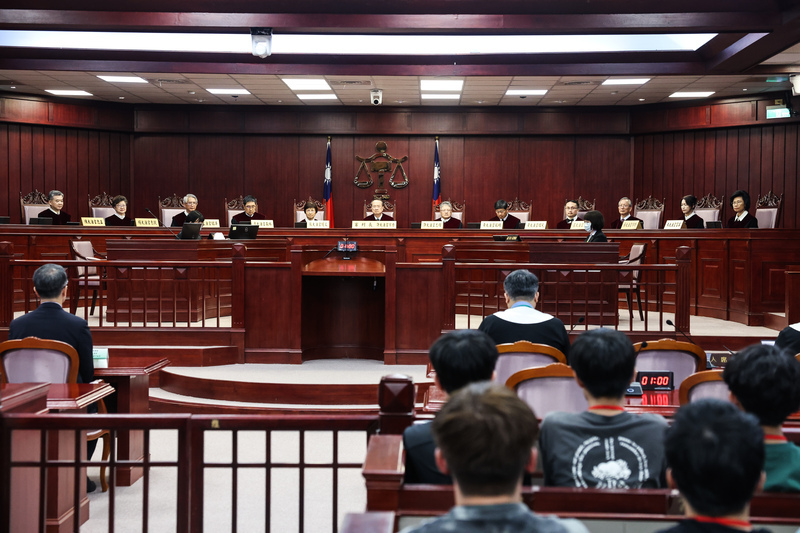In the constitutional review case of death penalty, the Taiwan’s Constitutional Court announced the verdict this afternoon (20th,Sept) that the death penalty is constitutional for homicide, forcible homicide, robbery homicide, and kidnapping for ransom homicide, but the application is restricted.
Wang Xinfu and 37 other death row inmates believe that the death penalty violates the constitutional principles of equality, survival, and proportionality, so they petition for the law to regulate constitutional review, and the Constitutional Court issued the judgement 113-Hsien-Pan-8 (2024) at 3 p.m. today.
According to the main text of the judgment, Article 271, Paragraph 1 of the Criminal Code provides for the death penalty, life imprisonment or imprisonment for not less than 10 years for murderers, the first paragraph of Article 226-1 on the death penalty or life imprisonment for intentional homicide for crimes against sexual autonomy under Articles 221 and 222, the death penalty or life imprisonment for intentional homicide for robbery under Article 332, Paragraph 1, and the death penalty or life imprisonment for intentional homicide for the crime of robbery, Paragraph 1 of Article 348, The crime of intentional homicide is the most serious type of crime that violates the right to life, and the death penalty is the heaviest part of the punishment, which can only be applied to the circumstances where the circumstances of the crime are the most serious in each case and the criminal procedure meets the requirements of the strictest due process of law in the Constitution, and within this scope, it is not contrary to the intent of the Constitution to protect the people’s right to life.
However, when the suspect in the above case is questioned or questioned, the defendant shall be present and may make a statement; At present, there are no relevant provisions in the Criminal Procedure Law, which violates the constitutional right to life, the defendant’s right to defense in litigation, and the principle of due process of law, the relevant organs should amend the relevant provisions within two years from the date of the announcement of the judgment, and the compulsory defense system and the part subject to oral argument shall be applied from the date of the announcement of the judgment, and the effectiveness of investigations and investigations that have been completed or concluded in accordance with the legal procedures shall not be affected.
In addition, the defendant in the above cases shall not be sentenced to death if he has significantly reduced his ability to recognize acts due to mental disorders or other mental defects at the time of his acts. The relevant authorities shall amend the relevant provisions within two years from the date of the announcement of this judgment, and the court shall not impose the death penalty on those who have mental disorders or other mental defects and whose ability to defend themselves is obviously insufficient until the completion of the amendment of the law.
As for the part of Article 348, Paragraph 1 of the Criminal Law, which stipulates the death penalty for intentional homicide for extortion of persons, the Chief Justice held that the use of the death penalty as the sole statutory punishment regardless of whether the circumstances of the crime have reached the maximum seriousness is inconsistent with the constitutional principle of culpability, and within this scope, it is contrary to the intent of the Constitution to protect the right to life.
針對死刑的憲法釋憲案,憲法法庭於今天(20日)下午作出裁決,認為殺人罪、強制性交致死罪、強盜致死罪及擄人勒贖致死罪的死刑處罰是合憲的,但適用範圍需加以限制。對於因精神障礙或心智缺陷而降低行為辨識能力或辯護能力的被告,不得判處死刑。此外,法庭強調程序保障,相關案件必須強制辯護並進行言詞辯論。
王信福等37名死囚主張死刑違反憲法中的平等權、生存權及比例原則,因此請求進行法規的憲法審查。憲法法庭於今天下午3時作出113年憲判字第8號的判決。
根據判決內容,刑法第271條第1項規定,殺人者可處以死刑、無期徒刑或10年以上有期徒刑;第226條之1前段則針對故意殺害性自主罪被害人的情形,規定可處以死刑或無期徒刑;第332條第1項及第348條第1項同樣對故意殺人者規定死刑或無期徒刑。這些故意殺人罪被視為對生命權的最嚴重侵害,死刑作為最重本刑僅能適用於犯罪情節極其嚴重且符合憲法要求的正當法律程序的個案,這樣的適用範圍與憲法保障人民生命權的宗旨並不相違。
此外,嫌犯在接受訊問或詢問時必須有辯護人在場並可表達意見;在第三審審判時,必須適用強制辯護制度,且必須經過言詞辯論才能宣判死刑。目前刑事訴訟法尚無相關規定,這違反了憲法保障的生命權、被告的防禦權及正當法律程序原則。相關機關需在判決宣示日起兩年內修正相關規定,強制辯護制度及言詞辯論的要求自判決宣示日起即時適用,已依法定程序完成或終結的偵查及調查不受影響。
另外,若被告在犯罪時因精神障礙或其他心智缺陷而顯著降低辨識行為能力,則不得判處死刑;若已被判死刑的被告存在精神障礙或心智缺陷,且其受刑能力不足,也不得判處死刑。相關機關需在本判決宣示之日起兩年內修正相關規定,並在修法完成前,對於自我辯護能力明顯不足的精神障礙或心智缺陷者,均不得判處死刑。
至於刑法第348條第1項關於擄人勒贖致死的規定,大法官認為不論犯罪情節是否達到最嚴重程度,皆以死刑作為唯一法定刑的做法不符合憲法的罪責原則,這在一定程度上違反了憲法對生命權的保障。



